- Đăng Ký
- Đăng Nhập
- Mở Shop

While guaranteeing accurate and convenient payment of salary is important, adheres to the various laws and regulations, for example, labor law, PF, PT and other law compliance is also critical. Non-adherence to these laws can attract serious legal and financial results.
In this article we will discuss about A Guide to Payroll Management System . and more related subtopics.
To make sure that your workers are happy and you are law compliant, you want to have a legitimate understanding of what payroll is and how to really run payroll. We will start with the basics of payroll.
What is Payroll?
Payroll is a rundown of workers who get compensated by the company. Payroll also alludes to the total amount of cash business pays to the workers. As a business capability, it includes:
Creating organization pay strategy including adaptable advantages, leave encashment strategy, and so forth. Characterizing payslip parts like basic, variable pay, HRA, and LTA Gathering other payroll inputs (eg, the organization's food seller may supply information about the amount to be recuperated from the workers for meals eaten) The actual calculation of gross salary, statutory as well as non-statutory allowances, and arriving at the net pay Releasing worker salary Keeping levies like TDS, PF, and so forth with appropriate authorities and documenting returns Various Parts of Payroll-greytHR
To put it plainly, we can say that payroll cycle includes arriving at what is because of the representatives also called 'net pay' after adjusting necessary taxes and other allowances.
The equation for calculating the net pay
Net pay = Gross pay gross derivation
Where,
Gross pay or salary = All kinds of regular pay + allowances + any one-time payment or advantage
Gross derivation = All kinds of regular derivations + statutory allowances + any one-time allowances
What are the Stages to Handling Payroll? A payroll officer requirements to do careful planning. There are always progressing tasks that need attention and a constant need to screen changes to savings, commitment to social security reserves, and so on. The whole interaction can be parted into three stages, pre-payroll, actual payroll and post payroll activities.
3 Stages of Payroll-greytHR
Pre-Payroll Activities
Characterizing Payroll Strategy The net amount to be paid is affected by various factors. The company's various approaches like pay strategy, leave and advantages strategy, attendance strategy, and so on become possibly the most important factor around then. As an initial step, such strategies should be obvious and get approved by the management to guarantee standard payroll handling.
Gathering Data sources The payroll process includes interacting with different departments and faculty. There can be information like mid-year salary correction data, attendance data, and so on.
Payroll Information Sources-greytHR
In smaller organizations, these information sources are gotten from a consolidated source or less teams. Be that as it may, in a larger organization, the task of gathering data may look overpowering. In the event that you are utilizing a smart payroll system having integrated features like leave and attendance management, worker self-administration portal, and so on inputs assortment process does not remain an issue.
Input Validation
Whenever inputs are gotten, you really want to check for validity of the data concerning adherence to company strategy, authorization/approval matrix, right formats, and so on. You also need to guarantee that no active representative is passed up a great opportunity and that no inactive worker records are incorporated for salary payment. Read top 6 payroll validations to guarantee accurate payroll.
Actual Payroll Cycle
Payroll Calculation
At this stage, the validated information data is taken care of into the payroll system for actual payroll handling. The outcome is the net pay after adjusting necessary taxes and other derivations. When payroll process is finished, it is always a decent practice to accommodate the values and confirm for accuracy to avoid any blunders.
Payroll digital book
Post-Payroll Cycle Statutory Compliance All statutory derivations like EPF, TDS, ESI are deducted at the hour of handling payroll. The company then dispatches the amount to the individual government agencies. The recurrence can vary contingent upon the sort of the levy. Much of the time, payment of levy is made via challans. After all contribution are paid return/report are recorded. E.g., for documenting PF return, ECR is generated and recorded.
Payroll Accounting
Each organization tracks all its financial transactions. Salary paid is one of the significant operating costs which has to be accounted for in the books of accounts. As part of payroll management, it is essential to make sure that all salary and repayment data is taken care of accurately into accounting/ERP system.
Visit our website for more information: https://ondemandint.com/
Chú ý: CongMuaBan.vn không bán hàng trực tiếp, quý khách mua hàng xin vui lòng liên lạc với người bán.